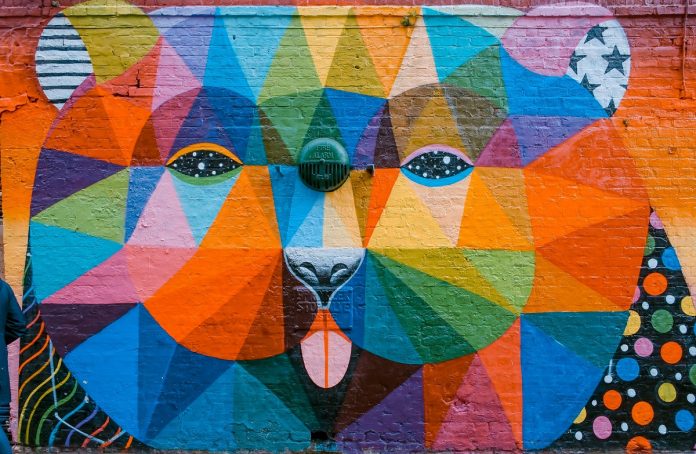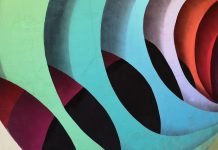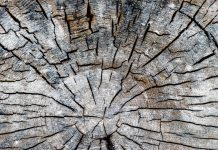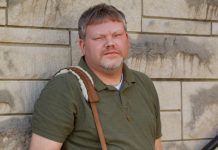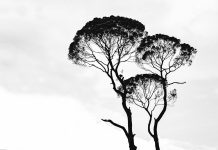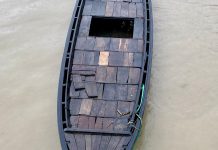Translated from Macedonian by Elizabeta Bakovska
My brother loved to eat soil, and I had to watch that he didn’t: do not let him out of sight, he is fast, says my mother as she’s leaving to fetch some water. Just as she descends down the path, the little one is already raking the yard, seeking an opportunity to trick me. And he always finds a way to nibble on some black soil near the gate, or some red, like the soil near the dry locust tree, or even some white soil, like the one near the iron packsaddle of grandpa Ango’s horse, the horse that died on its hooves the moment grandpa and grandma Akta set foot in the yard. Grandpa would sometimes sit on the packsaddle, raise his head, cover his forehead with the embroidered handkerchief, close his eyes and inhale through his nose a couple of times. He would then loudly exhale through his mouth, asking me if I could sense the sea beyond the mountain. Of course I couldn’t, I just didn’t say it, my friend. When they buried him, they threw all the soil in the grave, but the hole would not get filled up. They even brought some soil that the fresco painters had dug out to make frescoes in the domes, but the grave still gaped empty. It wasn’t before sunset that father Bogomil noticed grandpa’s mouth was open, as if he were breathing out. He ordered that the sea embroidered handkerchief would be placed over his face, and then he crumbled some soil with his fingers, poured a little wine on the bump that had risen before us, and his work was done, he took the money. But that is another story, my friend; I’ll tell it to you some other time, when you paint from your memory. And now, in less then two hours, the plaster will dry and you’ll no longer be able to work on it; the mistakes can’t be corrected. The wind is fast in drying these earth colours diluted in quince tea, I know, I can smell it. In two hours you must finish painting me once and for all, or you will not be able to correct me later. Just as I am unable to correct what happened with my brother. I always followed him by tracking his scent; he never tried to taste the soil underneath the two winter apple trees, nor the one near our forgotten loom, the wooden plough, the old broken wine barrel, and grandma Akta’s shabby bridal chest. He was sitting on the iron packsaddle with the hand over his mouth, his palm turned outward. His eyes were smirking. So, he tricked me again, I say to myself.
One morning, while he was still asleep, I tried to understand how he could tell apart the soil he had marked for eating. Except the spot near the locust tree and the iron packsaddle, he adored the corner near the upper gate, right next to the fence. I took some soil between my fingers; it was soft and warm; it smelled of chamomile, although it was nearly autumn. The soil near the locust tree was like the watermelon preserve that Mom would serve to the guests only for Daddy’s name day, when he was alive, of course. Only the living need names, I said to myself. Between the gate and the locust tree was the packsaddle, the iron skeleton of it, brought to the yard sixty years ago. I sat down and tried to poke the soil underneath it; my index finger sank quite easily: it smelled of rain that had just stopped, of the first snowflakes touching the yard, of the blades of grass under the eaves that Mom would pull out with her hands; it smelled of Daddy coming back from abroad, it smelled of our over-ripe fig, it smelled of the leaves falling from the grapevine, it smelled of grandma Akta’s tears, even though I barely remember her; remembrance is only a shred of what had been the truth, so maybe I don’t remember her at all, maybe I only have remnants of an image that I had painted in my head. Surely, my friend, of course, you know it best, for what you are painting on the wall is mostly you, remembering what you have seen, and barely myself sitting on the tripod, although you gaze at me to compare what you see with the memory that you paint. Revision, too, is a memory of the revision. I mean, as I was sitting on the packsaddle, I suddenly remembered that grandma knew all the spots around the village where she could find all the types of soil she needed; she knew where to find soil for molasses, for pumpkin preserve with grape juice and sesame; she knew which soil was used for painting of the stable and the porch, which one was used for coating the wooden floor in the room downstairs, and which was used by the fresco painters that painted the church walls of this very church, of this porch that stands to the right of the bell tower entrance, where I am still sitting and you are still standing; I as a painting drying together with the plaster, and you as a red signature on it. I was sitting on the packsaddle in the yard, and the steed of memories, rushing through time, was taking me God knows where; I could hear waves splashing in my ears, and then, as if I had returned home from a journey, I saw my brother again, seated near the locust tree. Although the tree was completely withered, we would hang a swing from the big branch, the one on the top facing the yard, and we would swing. The ropes screeched, the swing swung, and with it, as if in play, swung the locust tree. The boy was now leaning his back on the tree trunk, and he was scraping something between his legs, carried away in the process of digging, as if he was looking for something in the root, and very soon there was a heap of soil in front of him; he was dragging it and piling it up on his stomach. And he was digging again, dragging the soil up his tummy and murmuring. I think he was crying because I could hear him sniff, he was just crying and sniffing. I got up from the packsaddle with an intention of slapping him, but at that very moment I heard a smothered crack coming from the inside of the tree trunk, and the tree slowly leaned backwards. As soon as I grabbed the boy by the shirt, the locust tree crashed and started sliding downhill.
The next morning, the birds that usually landed on the tree were fluttering their wings in astonishment, wishing to recall yesterday, wanting to rest on a branch they remembered, the branch that should have been there. A magpie persistently waved its tail, convinced it was standing on the branch. Our cat climbed almost to the spot where we’d tie the swing, prepared to jump and then spun in the air, turning over as it landed in the nettle somewhere. Father Bogomil’s dog very much loved the locust tree as well; it would press its front paws against the trunk, and remembering it’s a dog, it would scratch at the root rising above the ground and leave cheerfully, accompanied by the flies that were drawing a second dog in the air around it. Now, the dog did the same, but its snout slammed in the dust instead. Frightened, it looked up, and with the tail between the legs, it ran away whimpering, as if punished. For days I observed the animals and their persistent belief that the locust tree still exists, that it is still there. I wondered how long it would take for them to understand that it is no more, how long it would take for them to forget it, although I knew that memory is an eternal longing for our own time. Only the memorized time is our own. Still, the memory of the tree is not the tree itself, I wished I could tell the birds that wallowed in the air, after unsuccessfully trying to perch on the branch they remembered. Only one collared dove with a red stripe around the neck acted as if nothing had happened to the tree; it circled over the yard, lifted itself above the house and from there, pressing air with its wings, it landed exactly on the same old branch it used to land on. Flicking its tail, it raised its head and started to coo, to rejoice. Of course, I couldn’t understand how that was possible, but I knew that God works in mysterious ways, hence some things will never be completely revealed. Down there, under the hill, father Bogomil was eyeing the locust tree trunk; he measured it foot by foot, and then sat down on it. A short little man, with a tiny moustache under his nose, stopped in the middle of the path and asked him how long he should fast so that his sins would be forgiven: You will fast until you’ve returned to the earth you are taken from; for you are dust and dust you shall be, mumbled the priest as he rose, and the tiny man ran away as if scolded, disappearing behind the pumpkins like a little mouse. And just as I turned to look, my friend, the miracle behind me had already happened, and now I am only trying to retell it. Listen, just like the dove never forgot about the locust tree, I will never forget what happened then, but only if you write it down under the painting: between my strange brother and me gaped an enormous abyss; he was standing near the gate, and I was on the other end, where the locust tree once had been; marvellous colours, as raindrops of light, were dripping between us; I watched as red clover and thyme spread around the edges of the abyss, and together with them a whispering shadow spread, as if our locust tree was still there, rustling. Chicks with little silver feathers and human-like heads were pecking in the shadow. My brother wore his white shirt which now covered his body all the way to the knees, like a dress; the palm facing outward was still over his mouth, and on his head was a green wreath. Down at the very bottom were the iron packsaddle of grandpa Ango, the loom that Mom kept for no particular reason, the wooden bed that we used to put under the winter apple tree in summer, the table and the chairs that were arranged under the grapevine, the jugs we kept on top of the loom, the windlass and the bucket together with the well, the distaff and grandma Akta’s old bridal chest, and a lot of other things, my friend. Only I, the house, and my brother stood on the edge, each of us on a different side: How did he manage to eat that much soil, I wondered, leaning on the non-existent locust tree. – What am I going to tell Mom when she comes back with the water? – I said to myself.
And I don’t know what I told her, my friend.
All I know is that my brother remained on the other side, forever, alone in the memories; he never called, never came back, not even as the scent of the sea, nor as a swallow, though for years I observed our swallows as they stuck tiny scraps of mud under the eaves. From time to time I wonder if the soil they are bringing from afar is indeed our own; maybe it smells of the sea, but I cannot sense it; maybe the pellets of mud, descending from the sky to be stuck under the eaves are a part of my brother, my little brother that liked to eat soil, and I had to watch he didn’t.
That’s all, my friend.
Now I’ll be silent, I don’t want you to paint me with my mouth open; there is no time for corrections.
About the author:
Blaze Minevski (1961, Macedonia) is the author of the novels “Me, Lenin and Mickey Mouse”, “We Should Have Taken a Photo before We Started Hating Each Other”, ”A Story about a Third Party, “The Mark” and ”The Performers”. ”The Mark” won the award “Stale Popov” (2007) for the best book of prose, given by the Macedonian Writers’ Society, the award “Novel of the year” given by the newspaper ‟Utrinski Vesnik” and the award ”13th of November” given by the City of Skopje. He also has to his credit numerous short stories that have won wide acclaim.


